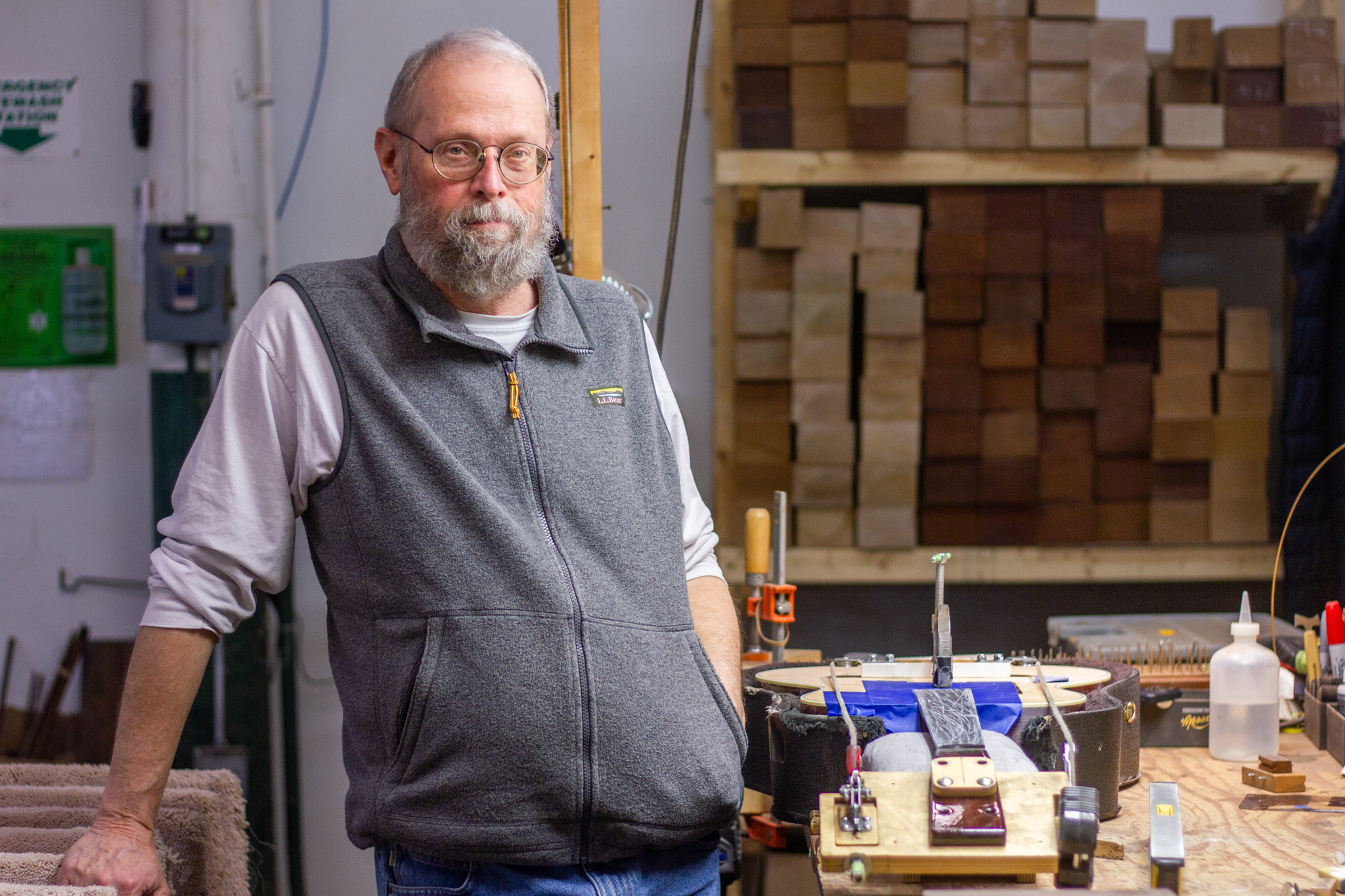Bourgeois Guitars manufactures musical marvels
April 15, 2022
 Reuben Schafir
Reuben Schafir“It was awful—it was crude. But it worked,” Dana Bourgeois ’75 said with a humble chuckle while speaking of the first guitar he built. Today, however, Bourgeois, 69, is a luthier with nearly fifty years of experience. Bourgeois led the way through a maze of hallways that separate the various production spaces for the guitar company bearing his name. He explained the stages of building a guitar through a KN-95 mask and wavy mess of gray facial hair. Dressed in jeans and a plain L.L. Bean fleece vest, Bourgeois looks like a woodworker rather than the CEO of a guitar company that makes instruments the average of which sells for $7,500 on the street.
“I don’t have an office here,” he joked, leading me into a back room cluttered with unfinished guitar necks and detached tops.
Bourgeois’ career as a luthier began during his junior year at Bowdoin. It was 1974 when he happened upon a book titled “Classic Guitar Construction” in the bookstore that would eventually become Gulf of Maine Books. He set to work shortly thereafter on his first guitar, working out of his dorm room in the Psi Upsilon fraternity house now known as Quinby House.
Bourgeois purchased wood and tools from a boutique guitar builder in New Hampshire and returned to his family home in Westbrook on weekends to use his machinist grandfather’s shop space for steps that he could not complete in his room.
Today, Bourgeois Guitars makes some of the highest-quality guitars on the market. Bourgeois still lives in Brunswick and commutes daily to Lewiston, where his company’s factory lies within the city’s aging mill buildings. The company makes roughly 400 guitars by hand each year.
Bourgeois’ instruments have found their way into the hands of many prominent musicians, including Bryan Sutton, Ricky Skaggs, Sierra Hull and Sarah Watkins. It was the guidance from bluegrass luminary Tony Rice that helped Bourgeois develop his early models.
“I built the last guitar that Doc Watson ever played,” Bourgeois said.
Despite his fame among top-tier musicians, Bourgeois is not among the cadre of alumni with whom the College maintains regular contact (in contrast, Bourgeois joked that he used to shoot pool with his classmate Stanley Druckenmiller ’75 H’07).
On the other hand, Bourgeois retains a strong connection to the state of Maine.
“I have pretty deep roots in Maine—I’ve pretty much lived in Cumberland County my entire life. You don’t hear that much anymore,” he said. “My other home, more so than Westbrook, is Chebeague Island in Casco Bay. My family’s [roots] go back there to the late 1700s.”
Bowdoin was Bourgeois’ top choice for college. He had fallen in love with both Brunswick and the College, and was admitted after applying early decision.
At the time of Bourgeois’ matriculation, the College was in a period of transition. The raucous party scene of the 1960s had begun to die down, and the College matriculated the first full class of women in 1971. Under the selective hand of Director of Admissions Dick Moll, the College’s student body underwent a shift.
“[Moll] was looking for a well-rounded class of individuals,” Bourgeois said. “Bowdoin has always been like a kind of a pre-law, pre-med factory. But the heyday of the ‘interesting individuals,’ at least for that era, was when I was there.”
While Bourgeois may have stood out as the student making a guitar in his dorm, his creative proclivities did not make him much of an outlier.
“It was the early 70s—doing things that were a little bit counter-cultural wasn’t terribly weird at the time,” he said.
Bourgeois graduated in 1975 with a bachelor’s degree in Art History and spent the next year working as the curatorial intern at the Bowdoin College Museum of Art (BCMA). Meanwhile, he continued to build guitars and started to build a local reputation as a skilled guitar repairman. After a year at the BCMA, Bourgeois decided to pursue a career in instrument manufacturing.
“Everything [in the art world] was just a little too stuffy,” he said. “Whereas the music world—I love musicians. It was starting to look like it was worth pursuing and seeing where it would go.”
When Bourgeois says that he “never gravitated very far from home,” he means it. He opened his first shop in 1977 out of his apartment on Page Street, just a block from the College. He moved to Topsham several years later, and relocated the shop to Lewiston 20 years later.
Although he taught himself to be a luthier, Bourgeois says his Bowdoin degree has proved to be valuable.
“The purpose of a liberal liberal arts education is to expose a student to the bigger world and provide you with a means of teaching yourself to navigate that world,” he said. “There was no internet. There were a few books, and they were all rudimentary. There were no guitar schools. So I pretty much had to be self-taught.”
Bourgeois is known for his unique process of “hand voicing.” Bourgeois employs a method of “tuning” the guitar tops by tapping them and listening to the responses. This process allows him to adjust the braces that give the top strength according to unique resonance patterns of a given piece of wood.
“It’s always been a sort of a research project, and still is,” he said. “My Bowdoin education has held up very, very well.”
Although his life is too busy for any involvement with the College, Bourgeois said he would not rule it out in the future. He is currently in the process of expanding production through a partnership with Eastman Music, teaching young luthiers his method of hand voicing, and searching for a larger factory space.
“I’m just trying to get everything set up so I can, you know, ease off and maybe enjoy some other things,” he said.

Comments
Before submitting a comment, please review our comment policy. Some key points from the policy: